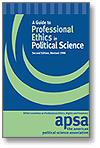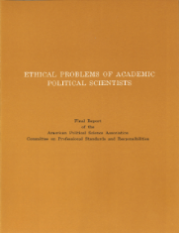APSA Announces Revision to the APSA Guide to Professional Ethics in Political Science
On February 14, 2022, the February Council Meeting, the APSA Council unanimously approved an update and revision of the APSA Guide to Professional Ethics in Political Science. On April 21, 2023, at the Spring Council Meeting, the APSA Council approved a new section of the appendix on Contingent Faculty Minimum Standards.
Read the revised APSA Guide to Professional Ethics in Political Science, Third Edition, 2022
The Guide was updated and revised by the APSA Committee on Professional Ethics, Rights and Freedoms with support from APSA staff. The Committee encourages departments and scholars to use the Guide as a training manual and reference -- both for students in the discipline and for faculty and administrators -- about best practices and crucial ethical issues. APSA and the Ethics Committee welcomes your feedback on the revised Ethics Guide. Please send any feedback or questions to ethics@apsanet.org.
Committee on Professional Ethics, Rights, and Freedoms
The responsibility of the Committee on Professional Ethics, Rights, and Freedoms is to protect the rights of political scientists and ensure that the ethical policies of APSA are followed. Contact the Ethics Committee.
The Role of the Committee:
APSA's committee on professional ethics, rights and freedoms is concerned about any ethical problem or personal abuse experienced or caused by political scientists acting in their professional capacity. The primary responsibilities of the committee fall into three major areas:
- Handling individual grievances and complaints that pertain to an APSA related meeting, conference or entity
- Writing ethical guidelines for the association, and
- Helping protect human rights of political scientists in other countries
How to submit a grievance
To submit a grievance or concern, email ethics@apsanet.org
or
Visit the new online incident reporting platform, APSA EthicsPoint.
- Click on “Make a Report” (at the top of the left hand side menu)
- Review the list of the types of reports that can be filed. (Click on “Details” to the far righthand side of report type, to view a description of each topic).
- Once you have identified the appropriate topic, click anywhere in the desired topical box to be taken to the complaint and grievance form.
- Fill out the form and submit to file a grievance, complaint or inquiry.
During a preliminary review period, the Ethics Committee chair and a sub committee will conduct a preliminary review of the complaint/grievance to determine if the committee, in its discretion, should formally investigate or take up the case based upon a number of factors, including but not limited to the following two criteria:
• Does the complaint or grievance pertain to or have some direct relationship to an APSA meeting, conference, workshop or entity?
• Is the complaint or grievance an issue or matter for which the association can reasonably seek meaningful remedy for the parties involved once an investigation is completed? (Does the association have enforcement power regarding remedies or sanctions?).
APSA EthicsPoint
What is Ethicspoint? Ethicspoint is a comprehensive and confidential reporting tool created by Navex Global to assist APSA with managing reports of harassment from meeting, conference, and workshop attendees, individuals with professional ethics grievances, and general ethics inquiries, related to an APSA entity or event, from APSA members and non-members EthicsPoint will also be used to address professional ethics grievances and complaints submitted by APSA meeting conference and workshop attendees.
Political scientists share ethical problems in common with practitioners of other scholarly disciplines. They also frequently encounter ethical problems unique to their professional concerns. To assist scholars in working through problems and differences the APSA maintains a standing committee to oversee complaints, resources on ethical principles for political scientists, particularly for those newly entering the profession and those conducting research involving human subjects.
Resources
APSA Guide to Professional Ethics in Political Science (2022)
The following guide includes links to information regarding the APSA's ethics guidelines ("code of ethics"), more about the APSA Ethics committee, the procedures for filing a grievance, human subjects research guidance, and APSA RESPECT. In February 2022, the APSA Council approved a revised and updated version of the guide, as completed by the APSA Ethics Committee, with support from APSA staff.

Download the Guide (pdf)
Principles and Guidance for Human Subjects Research (new)
At the 2020 APSA spring council meeting, the APSA council approved principles and guidance for human subjects research. In 2022, the new guidance was included in the updated and revised APSA Guide to Professional Ethics. The ad hoc committee on human subjects, formed in January 2017, identified broad principles of ethics relating to research on human subjects that can guide individual scholars in the design and practice of their research, inform institutional review boards about current standards and practices in political science research, and propose association standards in areas of broad-based agreement. The committee’s roster and charge are available online here.
Read the human subjects research principles and guidance
APSA Meetings Ombuds
The APSA meetings Ombuds is an informal, independent, and confidential resource available to APSA meeting attendees. The Ombuds speaks with any meeting attendee on a variety of topics including, but not limited to, consultation with any meeting attendees who believe that they have experienced any form of harassment, or who have concerns about violations of the sexual harassment provisions of the APSA anti-harassment policy while onsite at a meeting. Read more about the APSA annual meeting Ombuds.
Sexual Harassment Resources
APSA provides information on resources, both internal and external, related to sexual harassment prevention and response. Additionally, the association has a code of conduct / anti-harassment policy for APSA meeting attendees and policies and procedures for violations of the anti-harassment policy for meetings. Read more about APSA's sexual harassment resources
Member Revocation Policy
Members of the association, participants in the APSA Annual Meeting and the Teaching and Learning Conference, and individuals who hold association leadership positions (Council, Committees, and Fellowship and award/review committees) are expected to meet the commonly held standards of professional ethics and scientific integrity. In the rare case that an APSA member, a meeting or conference attendee, or an individual in a leadership position no longer meets this expectation, as established through outside investigative proceedings and determinations, the set of guidelines and procedures laid out in the Member Revocation Policy are to be followed to request revocation and for the consideration of the request to revoke an individual’s APSA’s membership, meeting participation privileges, and/or their association leadership positions and privileges.
History

In 1967 APSA created a committee with a broad mandate to explore matters "relevant to the problems of maintaining a high sense of professional standards and responsibilities." that committee, chaired by Marver H. Bernstein, published its report, "Ethical problems of Academic political scientists," In the summer 1968 issue of APSA's PS: Political Science & Politics. An enduring contribution of this committee was the development of a written code consisting of twenty-one rules of professional conduct. The Bernstein report, as it came to be called, also recommended the appointment of a standing committee on professional ethics and such a committee was duly created in 1968. The title, the work, and the jurisdiction of the standing committee have been in a process of continuous evolution since that time. Its original jurisdiction, for example, did not include individual cases. The committee was at first envisaged as an educational body to "protect the rights of political scientists" by the issuance of advisory opinions to guide the professional behavior of political scientists. Twenty-three advisory opinions have been adopted since the committee was established.
Read the 1968 Report in the member bookshelf.
In 1989, after some twenty years of experience, the APSA again created a committee to review the charter of what has come to be called the committee on professional ethics, rights and freedoms.
The charter review committee, chaired by lawrence j. R. Herson, incorporated the advisory opinions into the basic code of the association, revised and reorganized the statement of ethical principles, and brought other materials up to date. This newly revised guide remains the charter of the committee on professional ethics, rights and freedoms, and provides a statement of ethical principles fundamental to the practice of political scientists.
Related resources
Publishing Ethics - APSR / Cambridge University Press
Code of best practices in fair use for scholarly research in communication
From the Center for Social Media at American University